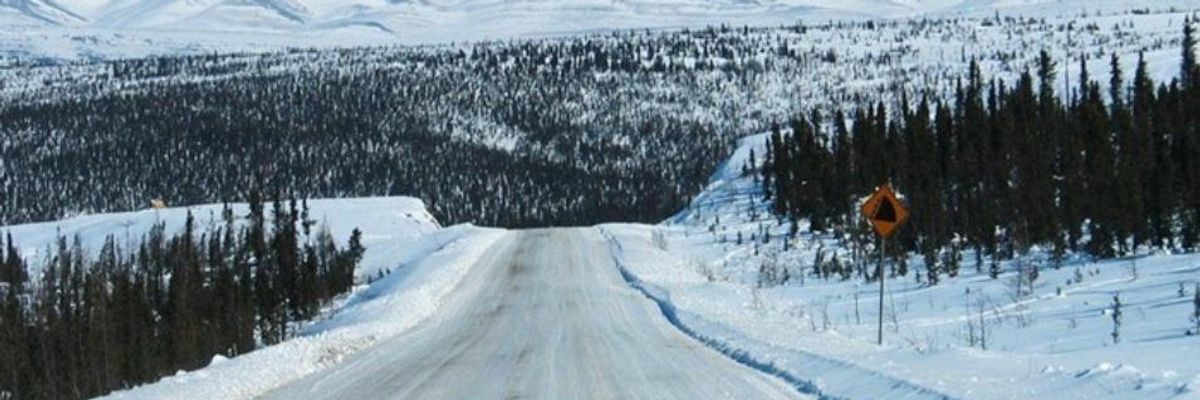"We can't go South, we can't go West, we can't go East, so, hey, lets' go North". That is the latest thinking of the Canadians in their increasingly desperate attempts to export the dirty, carbon intensive tar sands from Alberta.
At the moment, all the southern, western and eastern routes to export the tar sands are delayed or face years of legal challenges, so the Canadian's are looking North as part of their "market access options" for the tar sands.
The Southern route from Alberta to the US and lucrative markets of Europe is, of course, dependent on the Keystone XL pipeline, which has been mired in delay and controversy and is still awaiting a decision by the Obama Administration.
But any decision to proceed by Obama will be met with huge political and legal resistance.Obama will get a feeling of the anti-KXL sentiment at the forthcoming Peoples' Climate March in New York on the 21 September.
The Western route, via the Northern Gateway pipeline, would transport some 500,000 barrels per day from Alberta to British Colombia. Although it received regulatory approval in June, it faces huge opposition from Canadian First Nations, community and environmental groups.
The president of the Northern Gateway Pipeline company, John Carruthers, recently admitted that the possibility of the 2018 start-up date was "quickly evaporating." And even that now looks optimistic, as the pipeline could be bogged down in legal challenges for years.
The route East took a massive setback in July this year when the small coastal town of South Portland approved, by 6-1, to ban tar sands exports. The decision effectively barred any attempt by the oil industry to bring oil from Alberta to the city's port, the second-largest oil terminal on the east coast of the US.
So that leaves going North. It is therefore not surprising that Alberta is looking North in its latest desperate attempt to find a route to export the tar sands. The route is dubbed the Arctic Gateway Pipeline, which would ship 100,000 barrels of tar sands a day along the Mackenzie Valley to a port in Tuktoyaktuk, in the North West Territories.
It would be no mean feat in engineering being 2,400 kilometres in length, which is longer than both the Keystone XL (1,897 kilometres) and Northern Gateway (1,177 kilometres).
But a new $50,000 feasibility study, which has been commissioned by the Government of Alberta, believes that tar sands can be exported via this route and the Arctic Ocean. Alberta Energy spokesperson Ryan Cromb argues the report was "commissioned as part of our larger look at market access in all directions - east, west, north and south."
The report claims the route will bring badly needed economic development to that remote part of Canada. "If the Mackenzie Valley option goes ahead, the NWT will experience enormous growth in terms of industrial activity and population," the report states.
Ironically one of the reasons that the consultants who wrote the report believe the route is viable is due to melting sea ice from climate change. However the report warns of the catastrophic risks of a tar sands spill in the Arctic saying the region "lacks the equipment, personnel and logistical capacity to effectively respond to oil spills ."
It is not surprising that environmentalists see the prospect of a northern tar sands route as "horrifying."
"This is absolutely ridiculous that an Arctic route is being considered," said Mike Hudema of Greenpeace Canada.

